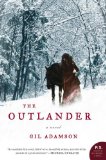Book Club Discussion Questions
In a book club? Subscribe to our Book Club Newsletter!
Please be aware that this discussion guide will contain spoilers!
Introduction
In 1903 a mysterious young woman flees alone across the west, one heart-pounding
step ahead of the law. At 19, she has just become a widow—and her husband's
murderer. As bloodhounds track Mary Boulton through the mountains, she is
tormented by mad visions and by the knowledge that her two cold-blooded
brothers-in-law are hot on her trail, determined to hunt her down in revenge for
their brother's death. Responding to little more than the primitive fight for
life, she flees further and further into the wilderness, and into the wilds of
her own mind, encountering an unforgettable cast of eccentrics along the way.
With the stunning prose and captivating mood of great works like Charles
Frazier's Cold Mountain or early Cormac McCarthy, Gil Adamson's
extraordinary debut novel weds a brilliant literary style to the gripping,
moving, picaresque tale of one woman's desperate journey.
Questions for Discussion
- When we meet the widow, she is emotionally remote, frightened, and
unable to form a plan. She has a strong will to survive, but few skills. By
the end of the book she seems like a different woman. Is she a different
person, or the same person with new skills? Never mind fictional characters,
is it possible for people to change?
- What is the cause of the widow's madness? Is this a manifestation of
severe post-partum depression, or has Mary always been a little off? Will
she always be, or is there some hope?
- Regarding religion, the author says of Mary that "she had a child's
disinterest in any father other than her own." Does Mary truly understand
faith? Does she herself have any faith? Has she has been given any real
instruction in faith? Does one need instruction? Of all the characters in
this novel, who has the greatest sense of faith, or of the divine?
- What motivates the bird lady to take in "strays and lame ducks"? She is
described as a Good Samaritan—do you think she is one? Why are Zenta and
Jeffrey so protective of her? Also, she tells the widow that the maid Zenta
"dislikes you more than any other person I've brought to the house." Is
there something about Mary that is different than the other "lame ducks"?
- The names in this novel are out of a fairy tale: the widow, the
Ridgerunner, the Reverend, the giant, the dwarf. Why did the author decide
to choose such archetypal monikers for her characters? Do the characters
come across as archetypes, or as fleshed-out personalities?
- While sewing an injured miner's wound closed, Mary thinks "This is what
the embroidery lessons were for." Did you learn anything new about women's
(and men's) lives at the turn of the last century? Is historical detail
important to you, or do you pay most attention to the story and character?
- At one point, the widow realizes she has found "a kind of amnesty" with
the Reverend. Is amnesty different from forgiveness? Do you think Mary wants
forgiveness, or that she forgives herself?
- The natural world itself is almost a character in The Outlander.
Different characters have different relationships with it. For instance, in
the "fine black boots," the twins seem out of place in the mountains, while
William Moreland has been content to live alone in the wilderness for over a
decade. What was your feeling about this element of the novel? In real life,
have most of us lost a sense of the natural world?
- After the avalanche, the widow lies in McEchern's store "as if dead" and
thinks "he is gone, he is gone." It seems clear she is thinking of Bonny—but
perhaps her lament for "him" is wider than that. What have men meant to her
over the span of this novel?
- After the landslide, Mary registers a change in herself. She is "like a
different woman, one direly accustomed to loss. With nothing to her name,
she had simply let go, let go of everything." What has she been holding
onto? What does letting go accomplish?
- "Find me." Why does Mary leave at the end? Does she want to live alone,
as Moreland has—or is it a lover's game? Will the Ridgerunner have much
trouble finding her? Where will she/they go now? Deeper into the wild, or
toward civilization?
Unless otherwise stated, this discussion guide is reprinted with the permission of Harper Perennial.
Any page references refer to a USA edition of the book, usually the trade paperback version, and may vary in other editions.
